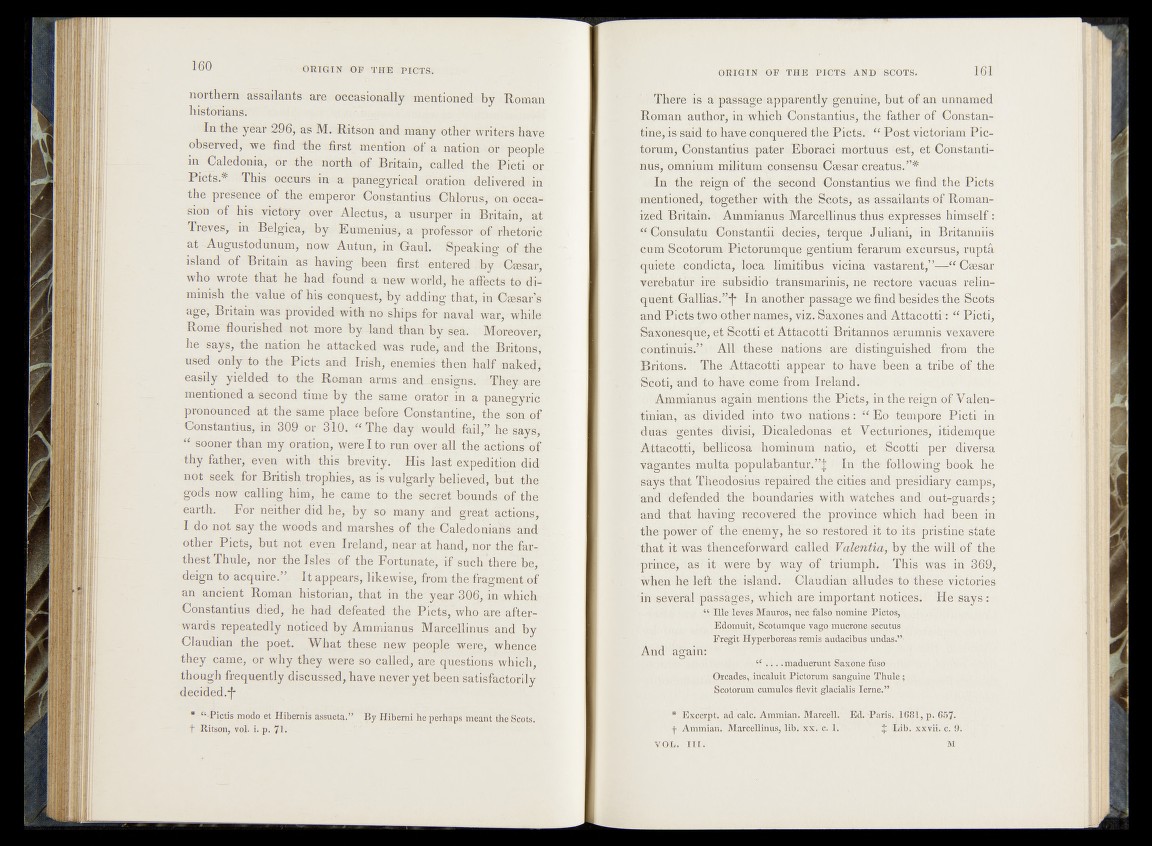
northern assailants- are occasionally mentioned by Homan
historians.
In the year 296, as M. Ritson and many other writers have
observed, we find "the first mention of a nation or people
in Caledonia, or the north of Britain, called the Picti-or
Piets.* This occurs in a panegyrical oration. delivered: in
the presence of the emperor Constantius Chlorus,: on occasion
of his victory over Aleetus, a usurper in Britain, at
Treves, in Belgica, !>y Eumenius, a professor o f rhetoric
at Augustodunum, now Autun, in Gaul.' •• Speaking- .of the
island of Britain as having been first -entered Caesar,
who wrote that he had found a new world, he affects to dimmish
the value of his conquest, by adding ,that,. in Caesar’s
age; Britain was provided.with no ships for naval war, while
Rome flourished not more by-land than by sea; - Moreover?
he says, the nation he attacked was rude, and the Britons,
used only to the Piets and Irish, enemies*-then half naked?
easily yielded to the Roman arms ami_ensigns*' Theya^S’
mentioned a isecondtime'by the same-orator in a panegyric
pronouriced a t the same place before Constantine* the son-of
Constantius, in 309 or 310. <c The day would fail,,J he says?"
“ sooner than my oration, were I to run over all the actions o f
thy fether;jeyen with thii^brevity. His last expedition^!?
not seek for British trophies, as is vulgarly believed, but the
gods now calling him, he came to the SCcret'bounds\of the
earth. For neither did he, by so many and great actions;
I do not say the woods and marshes of the CaledoniarJS and
other Piets, b u t not. even Ireland, near at hand, nor the farthest
Thule, nor Xhe Isles of the Fprtunate, if such there$ei-
deign to acquire.” I t appears, 1 ikewise, from the fragment of
an ancient Roman historian* that in the'year 306, in which
Constantius died, die had defeated the Piets, who are afterwards
repeatedly noticed by Ammianus Marcellinus and by
Claudian the poet. What these new people were, whence
they came, or why they were so called, are questions which,
though frequently discussed, have never yet been satisfactorily
decided.*}"
* “ rictis modo et Hibernis assueta.” By Hibemi he perhaps meant the Scots,
t Ritson, vol; i. p. 71.
" There is a passageupparently genuine, but of an unnamed
Roman author, in which Gonstantius, the father of Constan-
tinefissaid-t'a-have eo'nquered the Piets; “ Postvictoriam Pic-
torum, Constantius pater Eboraci mortuus est, et Constanti-
nus, omnium militum consehsnrChsar-creatus/’*
In the reign of the second‘ Constantiul^we find thé Piets
mentioned, together with the- Scots, as assailants of Romanised
Britain. Ammianus'Marcellinus thus expresses himself :
Consulatu Gonstantii deciesy’teripié -JiiMahi, ' in Britâlmiis
c um Scotorum Pictorumque; gentium ferarum' excursus-, ruptâ
quiete tcondieta^doca limitibus vrein'a;. vâstârént,”— “ Cæ.sâr
verebatur irë aubsidio'^transmarinis, në' Tfectöre; vâéu|aW relin-
quéht’ Gallias'.”*}* In anotheï^assage .we find besidésHhe Shots
andVPicts tyootlier- namesyviz.-SâSoDn'é^and A ttS c^ ft: “ Picti,
Saxonesque; et Scotfi èt;Attacotti Br-itannos* ærumnisfvé’xaverh'
cSóntinuis.” All these Nations '* ârè distinguished ?from the
Britbns. .The Attacotti • appear! ft©f®ayeV?bfeen a • tritó ip ^ th e
Scotl and |{®J$h,ave^cornerfrom Ireland.
m Ammianus Mgaih mentions the Piets*, in'the-reign fof Vaclen—
tinian, as divided mtA* two^nàtionfeh“ Eo gjj&rtpore' Picti in
du^M gèntès < divisi, Dicaledonas e t‘ Vréefuriones^ûtidémque
Attacotti, bellicosa. hominum nation • ?et?|Soé#f,iper divefsk
vagantbs bnulta populabantuiv”|c I h “thè^fdHo wingVbêp’k' her
sâys that Theodosius -repaired theicities and presidiary camps-,
'and defëndedf the boundaries with watches ahdf oufelguardS;
afid * th a t bavin gcrecovered the provided wHMii had bëèh'ùn
the* power" of thebnemy, he-so restored'it to* its, -pristine» state
that it was thenceforward called** Valentia, By-.the will loathe
prince, " as ; it were by way of triumph. This was fit’ 969|
when*he left the island. Claudian alludeskodthesotvihO^ies
in several -passages, which ar.e important hotipckfl He says:.”
Hie leves Mauros, nec falso nominer Piritos,;,
EdomuiwScoturnqye vago, nmerône secutas-h
Fregit Hyperboreas remis audacibus'ùnjaàs’;;’* -
And a^ainmi
' <e , i . . maduerunt Saxone fuso*',.*3 '
' Orcades, incaluit Pictorum sanguine Thule ;, =
.Scotorum cumuîos flevit glaçfalis Ieme.”
* Excerpt, ad talc. Ammian. Marcell, E d .'Pàrh.1681, p. 657.
Ammian. Marcellinus, lib, xx. c>8hH / Î Lib. xxvii. c. 9.